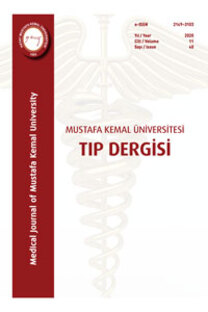Skolosidal Ajanlardan Kaynaklanan Sklerozan Kolanjitin Önlenmesinde Halofuginon ve Ursodeoksikolik Asidin Etkileri
Halofuginon, siroz, ursodeoksikolik asit, sklerozan kolanjit, fibrozis, skolosidal
The Effects of Halofuginone and Ursodeoxycholic Acid in Prevention of Sclerosing Cholangitis Caused by Scolocidal Agents
Halofuginone, cirrhosis, ursodeoxycholic acid, sclerosing cholangitis, fibrosis, scolocidal,
___
- Portmann B, Zen Y. Inflammatory disease of the bile ducts-cholangiopathies: liver biopsy challenge and clinicopathological correlation. Histopathology 2012; 60: 236–48.
- Hirschfield GM, Karlsen TH, Lindor KD, Adams DH. Primary sclerosing cholangitis. Lancet 2013; 382:1587–99.
- MacCarty RL, LaRusso NF, Wiesner RH, Ludwig J. Primary sclerosing cholangitis: findings on cholangiography and pancreatography. Radiology 1983; 149: 39–44.
- Tsochatzis EA, Bosch J, Burroughs AK. Liver cirrhosis. Lancet 2014; 383: 1749–61.
- Penz-Österreicher M, Österreicher CH, Trauner M. Fibrosis in autoimmune and cholestatic liver disease. Best Pract Res Clin Gastroenterol 2011; 25: 245–58.
- Ruemmele P, Hofstaedter F, Gelbmann CM. Secondary sclerosing cholangitis. Nat Rev Gastroenterol Hepatol 2009; 6:287-95.
- Coatney GR, Cooper WC, Culwell WB, White WC, Imboden CA Jr. Studies in human malaria. XXV. Trial of febrifugine, an alkaloid obtained from Dichroa febrifuga lour., against the Chesson strain of Plasmodium vivax. J Natl Malar Soc 1950; 9: 183–6.
- Sundrud MS, Koralov SB, Feuerer M, Calado DP, Kozhaya AE, Rhule-Smith A, et al. Halofuginone inhibits TH17 cell differentiation by activating the amino acid starvation response. Science 2009; 324: 1334–8.
- Keller TL, Zocco D, Sundrud MS, Hendrick M, Edenius M, Yum J, et al. Halofuginone and other febrifugine derivatives inhibit prolyl-tRNA synthetase. Nat Chem Biol 2012; 8: 311-7.
- Ward A, Brogden RN, Heel RC, Speight TM, Avery GS. Ursodeoxycholic acid: a review of its pharmacological properties and therapeutic efficacy. Drugs 1984;27:95-131.
- Saksena S, Tandon RK. Ursodeoxycholic acid in the treatment of liver diseases. Postgraduate Med J 1997; 73: 75-80.
- Paumgartner G, Beuers U. Ursodeoxycholic acid in cholestatic liver disease: mechanisms of action and therapeutic use revisited. Hepatology 2002; 36: 525-531.
- Hohenester S, Oude-Elferink RPJ, Beuers U. Primary biliary cirrhosis. Seminars in Immunopathology. 2009;31(3):283-307.
- Zhen YZ, Li NR, He HW, Zhao SS, Zhang GL, Hao XF, et al. Protective effect of bicyclol against bile duct ligation-induced hepatic fibrosis in rats. World J Gastroenterol 2015; 21: 7155-64.
- Reyes-Gordillo K, Segovia J, Shibayama M, Tsutsumi V, Vergara P, Moreno MG, et al. Curcumin prevents and reverses cirrhosis induced by bile duct obstruction or CCl4 in rats: role of TGF-beta modulation and oxidative stress. Fundam Clin Pharmacol 2008; 22:417–27.
- Pines M, Halevy O. Halofuginone and muscular dystrophy. Histol Histopathol 2011;26: 135-46.
- Cui Z, Crane J, Xie H, Jin X, Zhen G, Li C, et al. Halofuginone attenuates osteoarthritis by inhibition of TGF-β activity and H-type vessel formation in subchondral bone. Ann Rheum Dis 2016; 75: 1714-21.
- Pines M, Knopov V, Genina O, Lavelin I, Nagler A. Halofuginone, a specific inhibitor of collagen type I synthesis, prevents dimethylnitrosamine-induced liver cirrhosis. J Hepatol 1997; 27: 391-8.
- Bruck R, Genina O, Aeed H, Alexiev R, Nagler A, Avni Y, Pines M. Halofuginone to prevent and treat thioacetamide-induced liver fibrosis in rats. Hepatology 2001; 33: 379-86.
- Liang J, Zhang B, Shen RW, Liu J-B, Gao M-h, Li Y, et al. Preventive Effect of Halofuginone on Concanavalin A-Induced Liver Fibrosis. PLoS ONE 2013; 8: e82232. doi:10.1371/journal.pone.0082232.
- Yavas G, Calik M, Calik G, Yavas C, Ata O, Esme H. The effect of Halofuginone in the amelioration of radiation induced-lung fibrosis. Med Hypotheses 2013; 80: 357-9.
- Choi ET, Callow AD, Sehgal NL, Brown DM, Ryan US. Halofuginone, a specific collagen type I inhibitor, reduces anastomotic intimal hyperplasia. Arch Surg 1995; 130:257-61.
- Nagler A, Miao HQ, Aingorn H, Pines M, Genina O, Vlodavsky I. Inhibition of collagen synthesis, smooth muscle cell proliferation, and injury-induced intimal hyperplasia by halofuginone. Arterioscler Thromb Vasc Biol 1997; 17: 194-202.
- ISSN: 2149-3103
- Yayın Aralığı: 3
- Başlangıç: 2010
- Yayıncı: Hatay Mustafa Kemal Üniversitesi Tıp Fakültesi Dekanlığı
Doğan YILDIRIM, Okan Murat AKTÜRK, Ahmet KOCAKUŞAK, Mikail ÇAKIR, Oğuzhan SUNAMAK, Adnan HUT, Abdullah Kağan ZENGİN, Murat ÖZCAN, Hilal AKI, Huriye BALCI
Sinonazal Bölge Benign Kemik Tümörlerinin Radyolojik Değerlendirmesi
Gülen BURAKGAZİ, Hanifi BAYAROĞULLARI
Doğum Sonrası Depresyonun Tanı ve Tedavisi: Bir Gözden Geçirme
Takotsubo Kardiyomyopatili Acil Hastada Anestezik Yaklaşım
Sedat HAKİMOĞLU, Onur KOYUNCU, Sümeyra YEŞİL
Hatay’da PM10 ve SO2 Düzeyi ve Değişimleri, 2007-2017
TACETTİN İNANDI, Nesrullah AZBOY, Mehtap Canciğer ELTAŞ
Çocuk acil servisine göğüs ağrısı nedeniyle başvuran hastaların değerlendirilmesi
